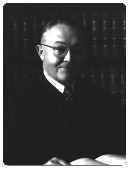Former justices

Justice Grover L. Broadfoot
Wisconsin Supreme Court Justice: 1948–1962Chief Justice: 1962
Life: 1892–1962
"His genuine humility was the kind, not that underrates one's self, but that is not puffed up and sees good in others wherever it may be found. The Wisconsin community is richer for the likes of Grover Broadfoot. Such men are rare." – Editorial, The Milwaukee Journal (1962)
Grover L. Broadfoot was born on December 27, 1892, in Independence, Wisconsin. His family later settled in Mondovi. He attended the University of Wisconsin, paying for school by working as a hotel bellhop and later as an editorial assistant at a Madison newspaper. He was editor-in-chief of the university yearbook, The Badger. He earned a law degree from the University of Wisconsin in 1918, but did not practice law until he completed service in the U.S. Army during World War I.
After the war, Broadfoot became active in public service. He was the Buffalo County district attorney for 12 years, Mondovi city attorney for 20 years and mayor of Mondovi for four years. He was also president of Mondovi State Bank. After Broadfoot became a justice, he loved to return to Mondovi in the summers. In the poker games in Buffalo County he was known as "Old Stoneface."
Broadfoot was appointed to the Wisconsin Board of Tax Appeals in 1939, but resigned in 1943. A year later, he was elected to the Wisconsin Legislature. He served in the Legislature until his appointment as Wisconsin attorney general in 1948. He lost the primary election for attorney general later that year, but was appointed to the Wisconsin Supreme Court in November 1948. He was elected to the Supreme Court in 1952 and re-elected in 1955.
Broadfoot's colleagues on the Supreme Court noted that one of his greatest contributions in conference was his "prodigious memory" and his ability to act as peacemaker. He often recalled past decisions of the Supreme Court, relevant to the situation at hand, that had escaped the attention of the other justices.
Broadfoot became chief justice in January 1962. On May 3, 1962, decision day, Broadfoot revealed that his vision was so impaired that he was unable to read the mandate in a case in which he had written the opinion. He left the bench and never returned. He died on May 18 of that year. He and his wife Margaret Jacobi had one son, John.

